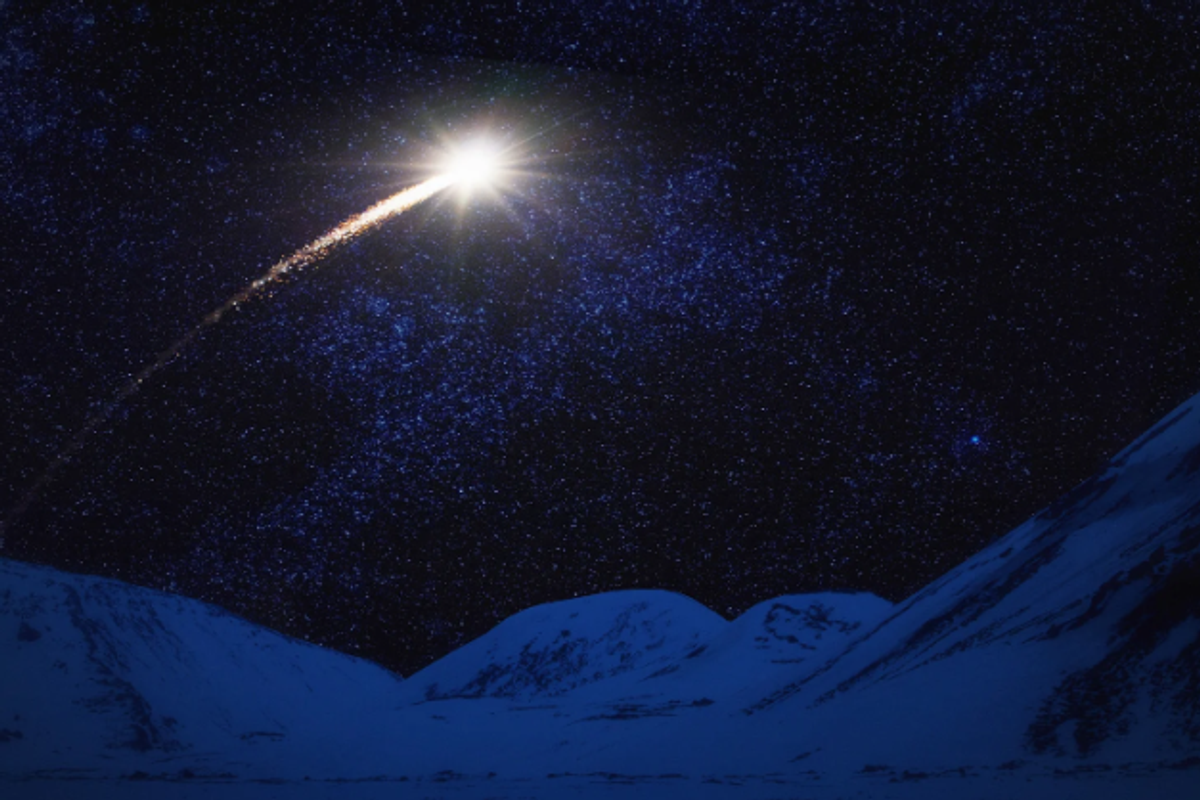Shooting stars: What happens when astronauts poop in space?
Astronauts use the atmosphere to their advantage.
A shooting star above a winter landscape.
Astronauts must undergo extensive training before they can enter space. They have to learn spacecraft operations, survival skills, robotics, physical fitness, how to walk in space, and emergency protocols in case something goes wrong. They also need extensive training on how to use the toilet.
How do astronauts go to the bathroom in zero gravity?
Astronaut Chris Hadfield, a former commander of the International Space Station (ISS), says that astronauts must learn to recognize that the urge to go feels different in zero gravity. “How do you know when you have to poop on earth? It's actually because of the weight of the poop inside you. Tells you, hey, it's time to poop,” Hadfield says. “Well, if you're weightless, then your body's not gonna tell you it's time to poop. So you almost have to learn this new sort of fullness symptom that tells you it's time to poop.”
@_cosmic_enigma How to poop in Space #astronauts #space #poop #iss #internationalspacestation #astronaut
Hadfield goes onto explain the rather ingenious of fans in space station toilets that mimic gravity for you. "Taking the place of gravity to pull the poop into the toilet is airflow," Hadfield explains. The fans work to suck the waste down once it leaves the body (this goes for urine as well, notes Hadfield). Though an impressive workaround, Hadfield certainly appreciates the effects of gravity after returning to Earth since it makes it a lot easier to go poop. “You're counting on gravity, cause gravity is gonna pull it away from you,” Hadfield said. “And without gravity, even when you're done pooping, the the poops just gonna stay sort of sticking to you. So we wear a rubber glove. And sometimes you have to, like, physically separate the poop from your body.”
Thank goodness for gravity.

Using air instead of water to suck waste into a space toilet makes things a lot less messy, too. You don’t want to flush your urine and feces in zero gravity. That would be a horror show. Being in space also does strange things to your poop. When astronaut Scott Kelly returned home after spending a year aboard the ISS, researchers found that his gut microbiome changed significantly from those typically found on the ground. It took a few months after Kelly’s return to Earth for his gut to return to normal.

Where does the poop go when astronauts use the bathroom in space?
When Kelly was on the ISS, the urine was transformed into reusable water aboard the space station. The feces, for which he produced over 180 pounds during his 340-day stay in space, is collected into bags and put on a small craft that is launched into space. Much like a shooting star or meteorite, the waste eventually burns up as it reenters the atmosphere, so you don’t have to worry about astronaut poop landing on the roof of your house.
Astronauts must be cautious about when and where they use the restroom while in space, so a diaper can be a valuable asset during their mission. There’s nowhere to go on a spacewalk, so astronauts wear diapers to avoid aborting their mission if nature calls 250 miles above the Earth's surface. They also wear a diaper during takeoffs and landings because it’s too dangerous to get up and walk around the cabin.
You have to master an incredible number of skills to be able to make it into space as an astronaut. You need to know science and engineering, but also possess a good sense of self. You must learn new ways of interacting with your body, and one of the most important values you can cultivate while exploring the final frontier is humility.
- Astronaut shares the profound 'big lie' he realized after seeing the Earth from space ›
- Woman breaks down how astronauts pee and poop in space in viral thread ›
- Why is it the closer you get to home, the more you have to pee? - Upworthy ›
- People are finally discussing the secret etiquette of pooping at someone else's house - Upworthy ›
- A man's bathroom emergency forced his partner out of the shower. Cue the online debate. - Upworthy ›
- People are finally talking about their sneaky techniques for pooping at someone else's house - Upworthy ›

